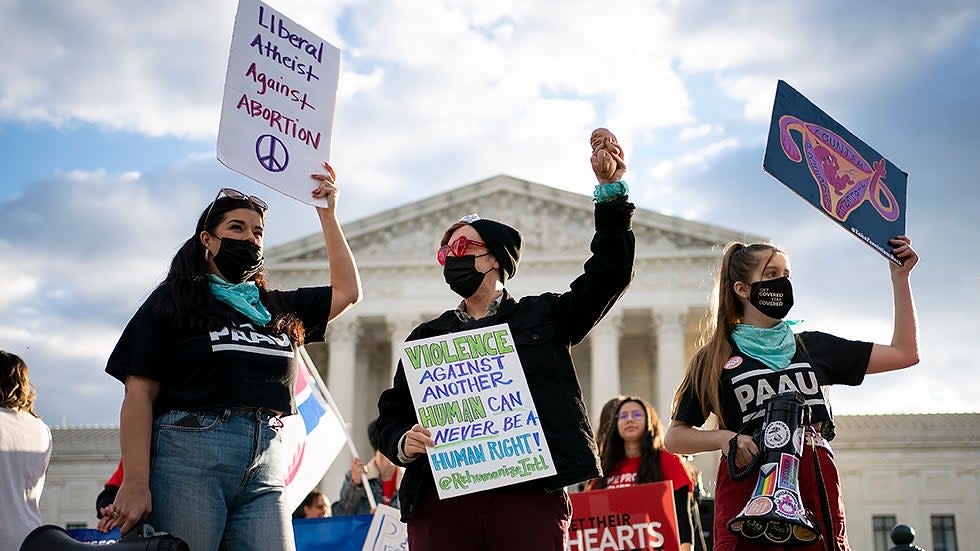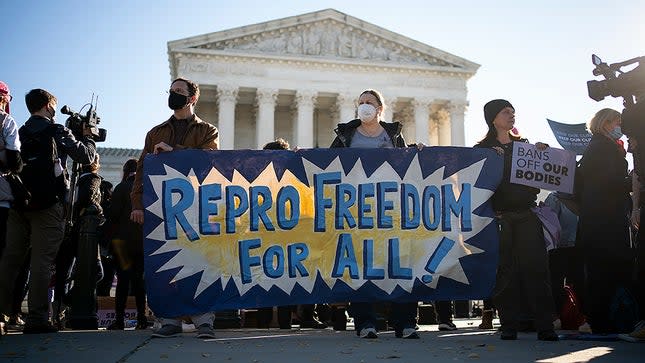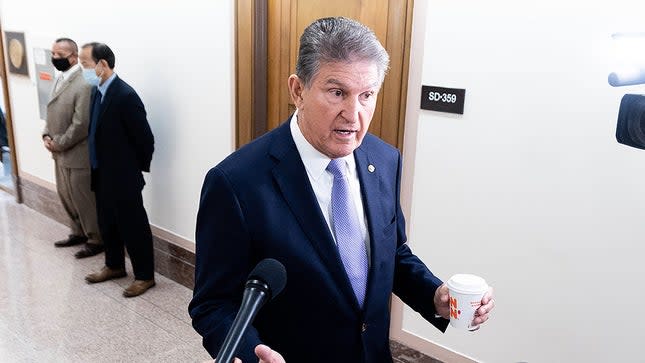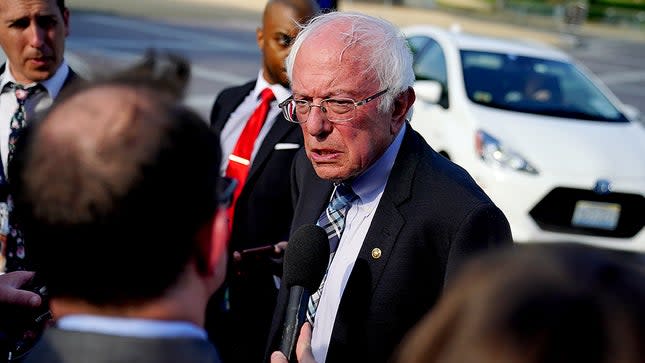Overnight Health Care — Presented by March of Dimes — Abortion access for 65M women at stake

Welcome to Friday's Overnight Health Care, where we're following the latest moves on policy and news affecting your health. Subscribe here: thehill.com/newsletter-signup.
It may not have been the homeowner's original plan to deal with a snake infestation, but burning your house to the ground and starting over seems like it was the best course of action here.
As conservative Supreme Court justices seem poised to rule against the abortion law in Mississippi, at least, 65 million women could lose access to the procedure if the justices go further and strike down protections enshrined in Roe v. Wade.
For The Hill, we're Peter Sullivan (psullivan@thehill.com), Nathaniel Weixel (nweixel@thehill.com) and Justine Coleman (jcoleman@thehill.com). Write to us with tips and feedback, and follow us on Twitter: @PeterSullivan4, @NateWeixel and @JustineColeman8.
Let's get started.
65M women could lose abortion rights

More than 65 million American women would immediately lose access to an abortion in their home states if the U.S. Supreme Court strikes down the landmark case that established the right to seek the procedure nearly half a century ago.
Existing laws on the books in 20 states ban abortions or impose substantial restrictions on women or on abortion providers. Those laws are on hold, either blocked by courts or superseded by the high court's 1973 decision in Roe v. Wade that protected a woman's right to an abortion without excessive restrictions.
But the high court is now considering arguments in another case, Dobbs v. Jackson Women's Health Organization, that gives the conservative majority their most significant chance in decades to gut the Roe precedent. In oral arguments Wednesday, the six conservatives seemed open to allowing a Mississippi law that bars abortions after 15 weeks to stand, undermining the core principles of the Roe verdict.
Post-Roe landscape: Twelve states - Arkansas, Idaho, Kentucky, Louisiana, Mississippi, Missouri, North Dakota, Oklahoma, South Dakota, Tennessee, Texas and Utah - have passed laws that would bar all or nearly all abortions, written in a way that would allow them to take effect after the Supreme Court overturns Roe, according to the Guttmacher Institute, a pro-abortion rights research institution.
Eight states - Alabama, Arizona, Arkansas, Michigan, Mississippi, Oklahoma, West Virginia and Wisconsin - still have abortion bans on the books that were passed years, and sometimes decades, before Roe was decided. Texas has a similar law that is under injunction by a federal court.
But if the precedent is struck down, those laws would be enforceable once again, and the Supreme Court ruling would likely allow Texas's law to take effect.
A MESSAGE FROM MARCH OF DIMES
The U.S. remains among the most dangerous developed nations for childbirth. Help prioritize the health of our nation's moms and babies by joining the #BlanketChange movement today at BlanketChange.org.
RESEARCHER WHO HELPED DISCOVER OMICRON BLASTS TRAVEL BANS
The scientist who helped discover the omicron coronavirus variant is ripping the travel bans that multiple nations, including the U.S., have imposed on certain African countries in an attempt to slow its spread.
"Is that how you reward science? By blacklisting countries?" Sikhulile Moyo, a virologist at the Botswana Harvard AIDS Institute Partnership who is considered one of the first to identify omicron, said in an interview with The Associated Press.
"The virus does not know passports, it does not know borders," Moyo added. "We should not do geopolitics about the virus. ... We should be collaborating and understanding."
Not much is known about the omicron variant, including how transmissible it is or if it can evade current vaccines.
The Biden administration has defended its travel restrictions amid criticisms from scientists and the World Health Organization, saying they are needed until more is known about the variant.
"I wouldn't anticipate the lifting of restrictions before we know more about the variant," White House press secretary Jen Psaki said. "None of these are meant to be permanent, none of them are meant to be a punishment, they're all put in place to protect the American people to hopefully save more lives."
BIDEN ADMINISTRATION TO SHIP 11 MILLION VACCINE DOSES ABROAD
The Biden administration is shipping 9 million COVID-19 vaccine doses to Africa and 2 million to other regions, the White House announced Friday.
White House COVID-19 response coordinator Jeff Zients announced plans to ship 11 million doses during a health briefing Friday.
"Just today, we are shipping 11 million doses. Eleven million doses in one day. That's more doses shipped by the U.S. in a single day than what all but seven other countries have delivered in total since the start of this pandemic," Zients said.
"Of the 11 million - 9 million are shipping to Africa - bringing our total doses donated to Africa to 100 million. That's American leadership. And we are calling on the rest of the world to step up and join us," he said.
Big picture: Biden has been under pressure from experts to do more. He has pledged to send some 1.2 billion COVID-19 vaccine doses abroad and has urged other wealthy countries to step up and make similar pledges.
A MESSAGE FROM MARCH OF DIMES
The U.S. remains among the most dangerous developed nations for childbirth. Help prioritize the health of our nation's moms and babies by joining the #BlanketChange movement today at BlanketChange.org.
Manchin to vote to nix Biden vaccine mandate

Sen. Joe Manchin (D-W.Va.) said on Thursday night that he is supporting a GOP effort to nix President Biden's vaccine mandate for larger businesses, which is expected to get a vote in the Senate next week.
"Let me be clear, I do not support any government vaccine mandate on private businesses. That's why I have cosponsored and will strongly support a bill to overturn the federal government vaccine mandate for private businesses," Manchin said in a statement.
"I have long said we should incentivize, not penalize, private employers whose responsibility it is to protect their employees from COVID-19," he added.
"I have personally had both vaccine doses and a booster shot," he went on, "and I continue to urge every West Virginian to get vaccinated themselves."
Big picture: Because all 50 Republicans are supporting the effort, Manchin's vote gives Senate Republicans enough support to pass a resolution to nix Biden's vaccine mandate for larger employers. The resolution would still need to pass the House and, even then, would likely be vetoed by Biden.
Sanders urges Biden to delay Medicare premium hike linked to Alzheimer's drug

Sen. Bernie Sanders (I-Vt.) wants the Biden administration to delay an increase in Medicare premiums for 2022 that is tied in part to a controversial, pricey Alzheimer's drug.
In a letter sent to President Biden on Friday, Sanders called on him to "prevent the outrageous increase in Medicare Part B premiums associated with the potential approval of the Alzheimer's drug Aduhelm."
He said the administration should delay Medicare's approval for use of Aduhelm until it is deemed safe and effective, and take executive action to reinstate and expand the reasonable pricing clause requiring drug makers that receive federal funding to charge reasonable prices for prescription drugs and treatment.
State of play: Medicare Part B, which covers services like doctors office visits, will increase by $21.60, from $148.50 in 2021 to $170.10 in 2022. Officials said that is one of the largest increases in recent years.
About half of that increase is due to contingency planning to make sure the program has enough money to pay for Aduhelm if Medicare decides to cover it.
Aduhelm: The drug, manufactured by Biogen, has drawn controversy both for its price, at $56,000 per year, and because the Food and Drug Administration (FDA) approved it despite doubts from experts about its effectiveness.
Two House committees have launched investigations into the FDA's decision, and acting FDA Commissioner Janet Woodcock requested a federal probe into the approval process.
WHAT WE'RE READING
A $2.5 billion plan to thwart omicron-like variants is stalled inside the Biden administration (Vanity Fair)
'Just stupid stuff': Logistics and lack of testing stymied finding the Omicron variant in the U.S. (Stat)
Covid-19 vaccine demand strains CVS, Walgreens (The Wall Street Journal)
STATE BY STATE
A tale of two Medicaid expansions: Oklahoma jumps in, while Missouri lags (Kaiser Health News)
Upstate New York hospitals are overwhelmed as Covid cases surge (The New York Times)
Overdose epidemic plagues California: Fentanyl is driving uptick in deaths (Cal Matters)
Texas now bans medical abortions after seven weeks of pregnancy (Texas Tribune)
That's it for today, thanks for reading. Check out The Hill's health care page for the latest news and coverage. See you next week.


